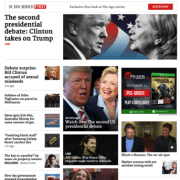A sub-optimal combination or How words and actions betray the self-obsessed
Irrespective of one’s political leanings, or view of the desirability of a second Clinton Presidency, the one thing that the current USA Presidential campaign is making very clear is that even in the age of self-obsession voters soon tire of obvious narcissists.
Someone needs to tell Donald Drumpf (yes, that is the original family name) that ‘leadership is not all about you’. As The Donald’s unravelling campaign demonstrates, people want leaders to be all about the concerns of the populace not the projection and protection of the candidate’s ego. So, no Donald, it’s not all about you, just as it was never, in our own example, all about Kevin, nor is it still.
The particularly disappointing thing about the Trump campaign is that it is so bad that it allows the Clinton campaign to do nothing other than say – ‘ well you can’t let him into the Whitehouse’. Policy discussion has not just taken a back-seat, it has been left at the curb.
The cult of personality is a shallow and lazy way to pick leaders. Perhaps the Trump candidacy, fed as it has been by the media new and old, will finally demonstrate that there needs to be some focus on more than grubby political blood sport. Yes, nasty narcissists have been, and still are, elected. However, ultimately, all have failed to be leaders of any quality and reputation. The shame of it is the damage done on the way through.
There has certainly been no shortage of such characters in the world of commerce.
What does all this tell business? Well, apart from driving more disillusionment with the political process, the lesson on leadership is plain. Words matter, a lot. Actions matter, even more and attitude matters, the most.
And, right on cue, up pops another example of actions not matching words.
When the, for now, CEO of Wells Fargo, John Stumph, faced a Congressional Hearing on the issue of the bank opening over 1 million accounts without customer’s knowledge – and charging them for the privilege- he claimed that the buck stopped with him. What he did, though, was to blame the 3,500 low level staff he fired for the breach (but only after regulators found out the bank was engaged in the massive fraud).
Senator Elizabeth Warren didn’t let him off lightly. She pointed out that he had not suffered one cent of penalty (he is paid over US$20 Million in salary and bonuses per year) and that not one senior executive had resigned or been fired. That, she scolded him, showed a total lack of accountability. Now he is unlikely to hold his job much longer and the bank’s board has ordered him to pay back $41 Million in bonuses and stock options.
Leadership is having and demonstrating the right attitude, saying the right words and matching them with the right actions. Egomaniacal rants about how “I alone can fix this”, ego insecurity that demands vicious and venal retorts to real and imagined slights and demeaning, disrespectful behaviour to ‘friend’ and foe alike, are not the marks of a truly successful and respected business leader. We can only hope that they prove to be just as unsuccessful in modern democracies.
RMK+A is highly experienced in assisting senior executives and CEO’s with strategic communications, including key message development and all aspects of stakeholder engagement.



